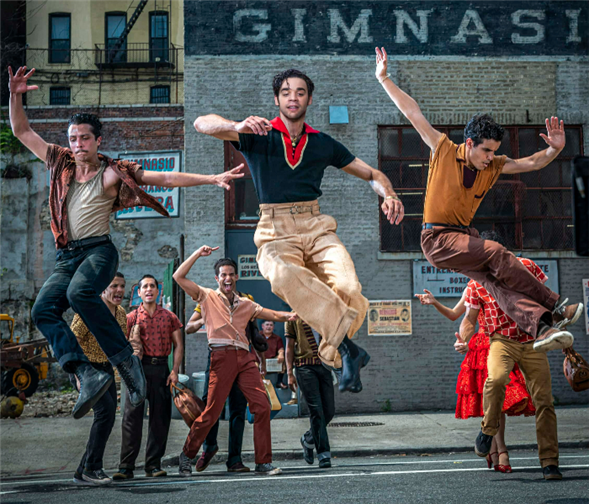How ‘West Side Story’ Saved My Dad’s Life
Home > TDF Stages > How ‘West Side Story’ Saved My Dad’s Life

And, in turn, me
—
Many of my Latino friends have long hated West Side Story for a variety of compelling reasons, particularly the brownface-filled 1961 movie. Yet my Papa, Alex Gonzalez, absolutely loved that film. According to him, it saved his life.
My Papa Alex died in 2012 and though we weren’t related by blood, he was the father figure I needed. We connected after I separated from my abusive birth family and moved in with my guardian. Papa Alex was my new mom’s best friend and a surrogate dad to her daughter. As soon as he met me, I think he said to himself, “You’re screwed up, so I’ll be your dad, too.”
Papa Alex liked to describe himself as a “big-ass Mexican former gangbanger.” He was 6′ 1″ and weighed at least 250 pounds. Although we were diametric opposites—I cultivated an urbane manner and he reveled in his rough edges—I loved him because he made sure that I knew there was nothing I could ever do to make him stop loving me.
Often when he’d pop in—usually unannounced—he’d insist we put on our VHS tape of West Side Story. He never did that with my adopted mom or sister; it was something strictly for us guys. We must have watched that movie together at least 30 times and he cried shamelessly at every viewing. Papa Alex first saw the film on a date at a drive-in theatre because he hoped an old-fashioned romance with singing and dancing would help him score with the hot chick he was seeing.
To his shock, instead of sex, he experienced an epiphany. For the first time in his life, he saw characters up on the big screen who were proudly Latino. Yes, most of the cast members were white and wore dark makeup; even the one lead Puerto Rican performer, Rita Moreno, was infamously forced to do brownface. Still, their words and actions had a profound impact on him.
Watching the Sharks and Jets fight over nothing inspired him to question what he was doing with his life. By the time the movie was over, he had decided that he didn’t want to die like Bernardo. That’s the day he started turning his life around.
I realize Papa Alex’s story was more complicated and nuanced than that but seeing West Side Story definitely changed his trajectory. Now that I am approaching the age he was when we first met, I understand why he selected that movie for us to bond over.
I was a psychologically, physically and sexually scarred gay teenager living in a homophobic Southern California town during the late ’90s. I don’t think Papa Alex had the words to talk to me about my sexuality at that point in time. Instead, he shared his love for a musical that left him emotionally exposed as a way of letting me know that I was his son and that we had things we could love together.
Watching Steven Spielberg’s West Side Story remake earlier this month, I couldn’t stop thinking about Papa Alex. I wish we could have seen it together. I even imagined our conversation: I would complain about the camera being too close to the action, and he would say, “Yeah, but that means I can see how pretty those ladies are without having to squint!” I would gripe about the lack of salsa and bomba in the orchestrations, and he would shout, “Mijo! Look at Anita’s hips! What else do you want?”
I suspect some changes would have annoyed him, especially the overall reduction in dance, and he wouldn’t have believed Ansel Elgort’s Tony could beat up David Alvarez’s Bernardo (I certainly didn’t). But even ragging on those aspects of the movie would have been fun for us.
More importantly, I imagine that the significant increase in violence would have helped us finally discuss the pain I had endured as a child. I started having sex with adults at age 10 because I was tired of being beat up by my birth parents, and I mistakenly believed that sex with grown-ups gave me power and love. This continued even after I learned that such behavior was hurting me. While Papa Alex often spoke of the fights he got into when he was a gangbanger, I never had the courage to reveal the statutory rapes I was still experiencing as a teenager. Because of the forceful way Anita confronts her attackers in this new version of West Side Story, I think I would have finally found the nerve to open up about what was happening and to apologize for not believing Papa Alex when he told me that I deserved the best.
Ironically, though West Side Story explores the absence of fathers, Papa Alex and I used it to connect as father and son. I realize the musical is a polarizing work of art, abhorred by some and revered by others. I love it not only because my Papa Alex did, but because it gave us the tools to talk to and learn from each other. While I didn’t cry during Spielberg’s remake, I know that Papa Alex would have—for both of us.
—
Juan Michael Porter II is the staff writer for TheBody.com and a contributor to TDF Stages, Did They Like It?, SF Chronicle, Christian Science Monitor, American Theatre, them, Into More and SYFY Wire. He is a National Critics Institute and Poynter Power of Diverse Voices Fellow. Follow him at @juanmichaelii. Follow TDF at @ TDFNYC.
Top image: David Alvarez as Bernardo, center, in Steven Spielberg’s West Side Story. Photo courtesy of Niko Tavernise/20th Century Studios.
